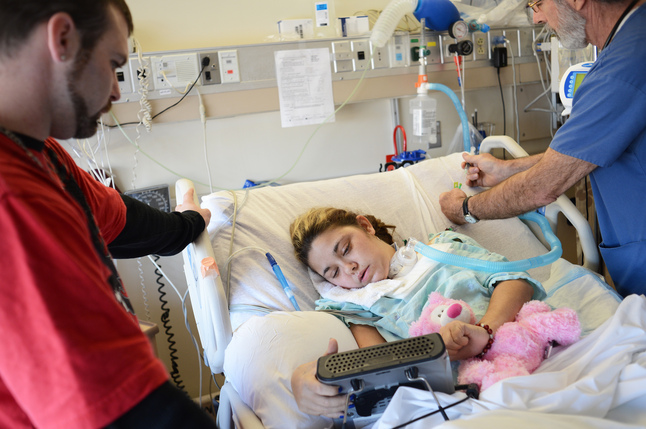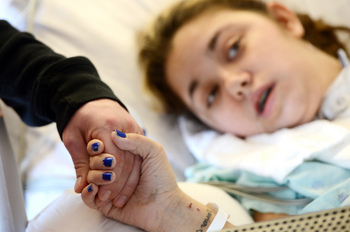
Jackson resident Dagan Gales, 28, watches as his wife Heather, 26, uses a computer to help her communicate as University of Michigan hospital RN Jon Stasevtich administers medicine into her IV Dec. 13 at the hospital. Gales has been in and out of the hospital since mid-November after being diagnosed with a rare form of Guillan-Barre syndrome.
Melanie Maxwell I AnnArbor.com
Heather Gales, 26, had been slowly losing feeling in her body since mid-November, beginning with her feet, then her legs and moving upward.
Searching for answers in and out of area hospitals, Heather was diagnosed with a rare form of Guillain-Barre syndrome: A disorder in which the body’s immune system attacks the nervous system, causing muscle weakness and respiratory problems.
The disorder spread rapidly, quickly rendering Heather's legs useless.
The medical bills began to mount as she was put into intensive care for a short period of time -- and the life of her family has been put on hold.
Now a patient in a neurology ward at the University of Michigan's University Hospital, Heather has not been out of a hospital bed for weeks on end. She can’t speak as a result of the tracheotomy that’s been placed in her neck to help her breathe.
“She went from being so active to so helpless,” said her husband, Dagan Gales, 28. “It is really hard to see her hooked up to everything like that.”
Typically, Guillain-Barre syndrome affects the sensory and motor nerves. For Heather, her nerves were affected more severely than in most cases of the syndrome, which means her entire body went numb.

Heather holds her husband Dagan's hand as she lays in a hospital bed at the University of Michigan Dec. 13. Gales has missed Thanksgiving, Christmas and three family birthdays while in the hospital.
Melanie Maxwell I AnnArbor.com
Dagan had been a stay-at-home father since he married Heather in July. Heather worked long hours on the line at a plant in Jackson manufacturing air conditioning units for vehicles.
Waiting to be hired on full time from her temporary employee status, Heather had opted to save her money and enroll in a health insurance plan with the company once she was hired.
Without insurance, Heather has since enrolled in Medicaid to help foot the bills for her hospital stays. Nevertheless, the family is facing financial struggles: They have received utility shutoff notices at their Jackson home, and are behind on their rent.
The family has started a Facebook page to support Heather's recovery during her illness, where they've posted information on how to donate money to help the family get through their hospital bills.
Diagnosis and treatment
Heather's nervous system — which controls basic functions like heart rate, blood pressure and temperature — also was affected to a larger extent than in most patients, said Dr. Ryan Jacobson, the doctor managing her treatment at U-M.
Two tests were used to confirm Heather's diagnosis: A spinal tap revealed a high protein level in a normal number of cells, and an electromyography test found her peripheral nerves and muscles were not responding in a normal way to small electrical shocks and needles, Jacobson said.
What brought the syndrome on is not entirely known. In some cases, receiving a flu shot has lead to individuals developing Guillain-Barre. Other viral and bacterial infections also have been linked to the syndrome.
Treatment for Heather's Guillain-Barre syndrome involves the intravenous injection of antibodies to try to neutralize the body’s attack against itself, Jacobson said. The treatment has appeared to stabilize the amount of numbness and weakness Heather has been experiencing, Jacobson said.
Friday, Heather was transferred to a physical therapy unit where she will work to regain her strength. Her ability to regain her muscle control and lung strength will determine how long she will have to remain in the hospital.
Role reversal
Dagan has been spending the majority of his days at his wife’s bedside in the University Hospital, making sure his wife can breathe through her tracheotomy and keeping her company. Cards expressing well-wishes fill her window.
At home, Heather usually is the one taking care of her husband. Now, the roles are reversed. The couple met each other in middle school, and life brought them back together recently.
“I would never wish this upon anybody,” Dagan said, explaining he only leaves his wife’s side for several hours at a time. “It hurts to have to leave her.”
Camping out in an armchair next to his wife’s hospital bed, Dagan has trouble sleeping at night.
The couple’s six children are each staying with their other parents, and Heather's unexpected, debilitating sickness has caused the family to miss three of their children’s birthday celebrations. Dagan worries the most about having a home for his wife to come home to when she is well enough to leave the hospital.
Using a computer device to help communicate, Heather Gales typed in a sentence on a morning in mid-December. She can’t speak because of the tracheotomy tube in her neck.
“It’s all tingly,” said the animatronic voice from the device, amplifying Heather's message in a British accent.
“I just can’t wait to hear my wife’s voice again,” Dagan said.
The future holds a lot of unknowns for the family. But Heather knows the first thing she’ll be doing as soon as she’s able to go home:
“Take a shower, see my kids and sleep next to my husband,” she said.
Amy Biolchini covers Washtenaw County, health and environmental issues for AnnArbor.com. Reach her at (734) 623-2552, amybiolchini@annarbor.com or on Twitter.